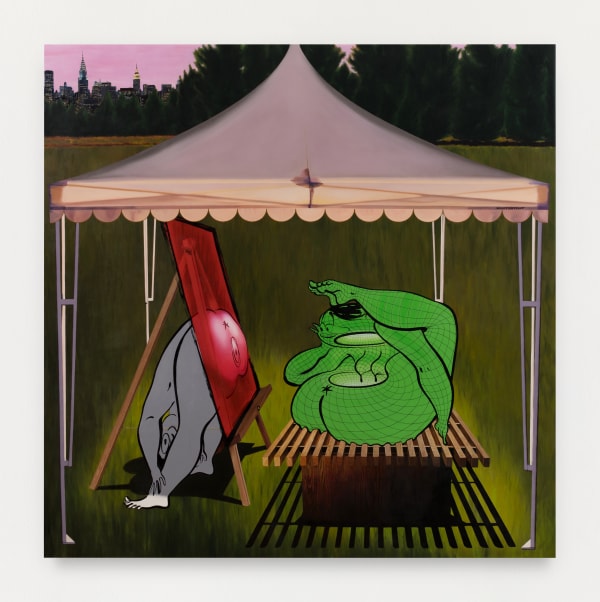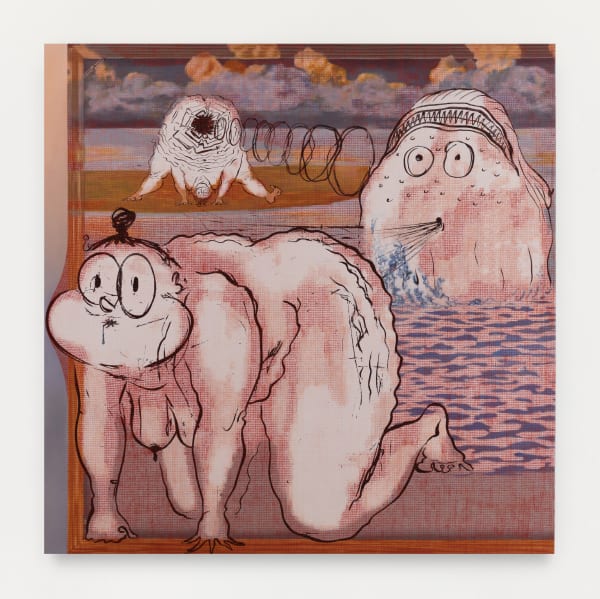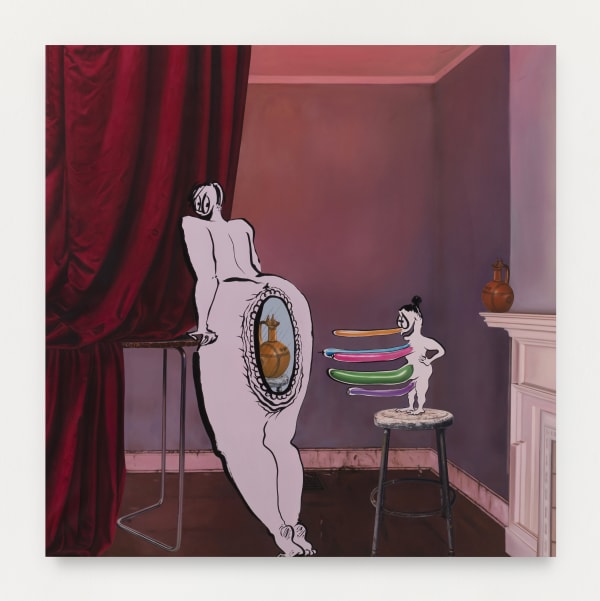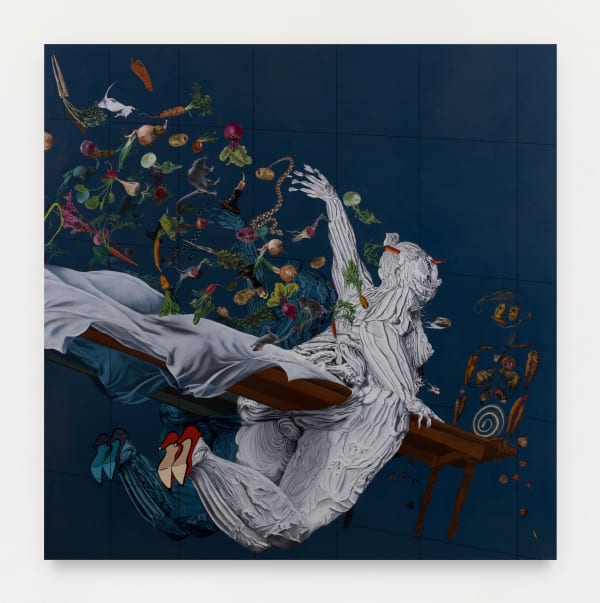Rumors Ebecho Muslimova
Like a telephone game ,
A play of trust and error,
a long distance romance.
Rumors and Whispers is a two-part presentation of Ebecho Muslimova’s recent series of paintings across Mendes Wood DM’s São Paulo gallery and Bernheim Gallery in Zürich. A transatlantic game of telephone, the exhibition first opens in Brazil with Muslimova’s Rumors suite, followed two weeks later by Whispers in Switzerland, each painting a response to one at the previous opening. Like the children’s game, telephone, where people whisper a word or phrase across a group in a successive chain, often to discover comical misunderstandings at the end, this body of work tracks the shifting persona of Muslimova’s signature character Fatebe. An abundantly curious and unabashedly liberated personality, Fatebe appears across all of the paintings in different forms, mischievously bursting into some frames and, in some instances, physically embodying a portal between them, translating or responding to the joke of a previous painting. From a stage to the boudoir, a park to a gallery, a New York skyline to an imagined landscape, these seemingly disparate spaces are the playground for Fatebe to explore the interplay between psyche and environment and reflect on the art-making process.
Muslimova began experimenting with Fatebe as a student at Cooper Union in New York to work through the often frustrating and confusing experience of being in art school. Originally presented as a flat line drawing, entirely in black and white, Fatebe thrived in the situations Muslimova put her in—contorting her body in impossible shapes–growing cow-like udders and milking herself, appearing as a magician and pulling a seemingly endless supply of other Fatebes out of her vagina, or opening herself up and filming down an infinite staircase spiral piercing into her body. While much has been written about a gendered reading of Muslimova’s protagonist and what Fatebe could mean for women’s sexuality and body image, what persists over more than ten years of Fatebe is a childlike hunger for corporeal and psychic exploration. While Fatebe operates as an alter-ego to Muslimova, a cartoonish id for the artist to visualize emotions and desires, Fatebe also exists as a personification of the act of painting. If a painting had a body, what forms would it assume? How would it engage with colour, form, and history? How many manifestations could it take in a single picture?
Fatebe Fenced Pigs (all works 2024) features a Goya-like bacchanal, with a line-drawing Fatebe lying on her back in brightly rendered grass, consuming pink cartoon pigs in equal measure that she pops out of her vagina and anus. In Fatebe Farm Mother, the paired work in Zürich, the flying piglets have nearly all died, transforming from their jovial cartoon-form into more realistically painted skeletons, a dark comedy on the shift of time. In Fatebe Clown Boudoir, we peek into a more intimate space, witnessing a small Fatebe-cum clown looking into a mirror that protrudes from another Fatebe’s vagina, with a reflection of a decorative vase Muslimova saw in the Metropolitan Museum of Art in New York shining back. Within the imagined tableaux, Muslimova realistically paints her studio stool, orienting herself within the painting and the landscape of New York. While she was born in Russia, Muslimova grew up in New York and continues to work there. While Fatebe largely exists alone in her universe, architecture has always operated as the secondary character, either forcing her to contract or buckling under her expansion. Architecture, whether referencing real places or imagined dreams or hellscapes, sets the stage for Fatebe’s game.
In Twenty Minutes in Manhattan (2009), the late architecture theorist Michael Sorkin chronicled a personal history of New York’s architecture and urban plan through the experience of his daily walk from his doorstep in the West Village to his office in Tribeca, meditating on the city as a changing organism. Muslimova’s journey through painting in this exhibition takes a similar form. Fatebe leads the viewer across various techniques on a daily and now decade-long process through different landscapes and across oceans within the same exhibition narrative. In the space between Fatebe Harvest and Fatebe Farm to Table, Fatebe metamorphoses from cartoon character and structural support of a skyscraper beam that doubles as a table to a lushly painted cream-form that is then penetrated by the structural support, before she finally dissipates into the rotting debris of an urban harvest, rats and all. Fatebe is inherently bound to the architecture of her environment, in turn holding it up and being blown apart by it.
Sorkin argues that “the modern city produces its own style of getting lost, rooted in its special form of alienation. Here, the crowd, while it can be protective, is also a medium for both erasing individuality and homogenizing experience, for making us disappear.” In the context of the city, Fatebe emerges as a stock image for the psyche of a generation who came of age around 9/11 and grew up during a rise of surveillance, digitization of the self, the proliferation of online avatars, and endless opportunity for connectivity through technology. In the face of anxiety around urban living, Fatebe’s world is a ketamine dream, a technicolor landscape where one can escape the chaos of the crowd and dissociate into the landscape–to melt into the pool of one’s subconscious (Fatebe Toad Self), boil over into a heaping mountain of trash (Fatebe Kettle Vision and Fatebe 4 Corners), or overflow with water to burst beyond the frame of the picture (Fatebe Wet Veil).
In Brazil, Fatebe further extends beyond the zone of painting and imposes herself onto the architecture of the gallery walls through a series of murals and drawings. These Fatebes add a further layer to this game of whispers and offer Fatebe more control as a character. While she has adapted and thrived in the often compromising, hysterical and at times abject positions Muslimova paints her into, here, Fatebe shits the narrative, darting between the paintings work in both galleries. We may now all fall into the spell of her cartoonish charm.
— Samantha Ozer
Ebecho Muslimova (b.1984, Dagestan) lives and works between Mexico City and New York.
Muslimova received her BFA at Cooper Union in New York, NY in 2010. Muslimova has presented solo exhibitions at Magenta Plains, New York, NY; Drawing Center, New York, NY; David Zwirner Gallery, London; Galerie Maria Bernheim, Zurich; White Flag Projects, St. Louis, and Room East, New York, NY.
Her work has been included in group exhibitions at Kunstmuseum Basel, Basel; ICA Miami, Miami; Renaissance Society, Chicago; Zuzeum, Riga; Hirshhorn Museum, Washington, D.C.; Swiss Institute, New York, NY; Kunsthalle St. Gallen, St. Gallen. Her large-scale murals have been commissioned for biennials such as The Dreamers, 58th Edition of October Salon, Belgrade, and the 32nd Biennale of Graphic Arts: Birth as Criterion, Ljubljana. In 2022, Muslimova was the recipient of the Borlem Prize, honoring artists whose oeuvres bring awareness to mental health issues & struggles. Her work has been featured in publications such as Forbes, The New York Times, Artforum, Art in America, Mousse, Artnet, Hyperallergic, and Cura Magazine, among others. Muslimova is included in Jeffrey Deitch's book, Unrealism, featuring 27 artists and major essays by Johanna Fateman, Alison Gingeras, and Aria Dean.
-
 Ebecho Muslimova, FATEBE WORM TO WORM, 2024
Ebecho Muslimova, FATEBE WORM TO WORM, 2024 -
 Ebecho Muslimova, FATEBE WET VEIL, 2024
Ebecho Muslimova, FATEBE WET VEIL, 2024 -
 Ebecho Muslimova, FATEBE CLOWN BOUDOIR, 2024
Ebecho Muslimova, FATEBE CLOWN BOUDOIR, 2024 -
 Ebecho Muslimova, FATEBE 4 CORNERS, 2024
Ebecho Muslimova, FATEBE 4 CORNERS, 2024 -
 Ebecho Muslimova, FATEBE NERVOUS GLORY, 2024
Ebecho Muslimova, FATEBE NERVOUS GLORY, 2024 -
 Ebecho Muslimova, FATEBE FENCED PIGS, 2024
Ebecho Muslimova, FATEBE FENCED PIGS, 2024 -
 Ebecho Muslimova, FATEBE BIRD SHIT BRAIN FOCUS, 2024
Ebecho Muslimova, FATEBE BIRD SHIT BRAIN FOCUS, 2024 -
 Ebecho Muslimova, FATEBE FARM TO TABLE, 2024
Ebecho Muslimova, FATEBE FARM TO TABLE, 2024










